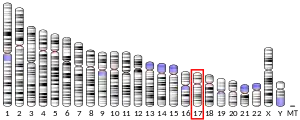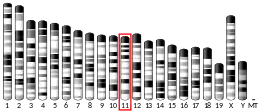NLK
Serine/threonine protein kinase NLK is an enzyme that in humans is encoded by the NLK gene.[5][6][7] Its name is an abbreviation for Nemo-Like Kinase, Nemo (nmo) being the Drosophila ortholog of the mammalian NLK gene.[8] This enzyme is a member of the Mitogen-activated protein kinase (MAPK) family, although not explicitly designated as such (it does not even have a numbered MAPK code). It is a highly divergent, atypical member of the MAPK group, lacking most features so characteristic of most mitogen-activated protein kinases (e.g. it does not have the dual phosphorylation motifs of typical MAPKs, and is not phosphorylated by any known MAP2 kinases). Its activation mechanism and downstream targets are still not well characterized.[9]
References
- GRCh38: Ensembl release 89: ENSG00000087095 - Ensembl, May 2017
- GRCm38: Ensembl release 89: ENSMUSG00000017376 - Ensembl, May 2017
- "Human PubMed Reference:". National Center for Biotechnology Information, U.S. National Library of Medicine.
- "Mouse PubMed Reference:". National Center for Biotechnology Information, U.S. National Library of Medicine.
- Brott BK, Pinsky BA, Erikson RL (Mar 1998). "Nlk is a murine protein kinase related to Erk/MAP kinases and localized in the nucleus". Proc Natl Acad Sci U S A. 95 (3): 963–8. Bibcode:1998PNAS...95..963B. doi:10.1073/pnas.95.3.963. PMC 18639. PMID 9448268.
- Kehrer-Sawatzki H, Moschgath E, Maier C, Legius E, Elgar G, Krone W (Jul 2000). "Characterization of the Fugu rubripes NLK and FN5 genes flanking the NF1 (Neurofibromatosis type 1) gene in the 5' direction and mapping of the human counterparts". Gene. 251 (1): 63–71. doi:10.1016/S0378-1119(00)00188-8. PMID 10863097.
- "Entrez Gene: NLK nemo-like kinase".
- Ishitani T, Ishitani S (January 2013). "Nemo-like kinase, a multifaceted cell signaling regulator". Cell. Signal. 25 (1): 190–7. doi:10.1016/j.cellsig.2012.09.017. PMID 23000342.
- Coulombe P, Meloche S (August 2007). "Atypical mitogen-activated protein kinases: structure, regulation and functions". Biochim. Biophys. Acta. 1773 (8): 1376–87. doi:10.1016/j.bbamcr.2006.11.001. PMID 17161475.
Further reading
- Bonaldo MF, Lennon G, Soares MB (1997). "Normalization and subtraction: two approaches to facilitate gene discovery". Genome Res. 6 (9): 791–806. doi:10.1101/gr.6.9.791. PMID 8889548.
- Volorio S, Simon G, Repetto M, et al. (1999). "Sequencing analysis of forty-eight human image cDNA clones similar to Drosophila mutant protein". DNA Seq. 9 (5–6): 307–15. doi:10.3109/10425179809008469. PMID 10524757.
- Kortenjann M, Wehrle C, Nehls MC, Boehm T (2002). "Only one nemo-like kinase gene homologue in invertebrate and mammalian genomes". Gene. 278 (1–2): 161–5. doi:10.1016/S0378-1119(01)00710-7. PMID 11707333.
- Wistow G, Bernstein SL, Wyatt MK, et al. (2002). "Expressed sequence tag analysis of human retina for the NEIBank Project: retbindin, an abundant, novel retinal cDNA and alternative splicing of other retina-preferred gene transcripts". Mol. Vis. 8: 196–204. PMID 12107411.
- Strausberg RL, Feingold EA, Grouse LH, et al. (2003). "Generation and initial analysis of more than 15,000 full-length human and mouse cDNA sequences". Proc. Natl. Acad. Sci. U.S.A. 99 (26): 16899–903. Bibcode:2002PNAS...9916899M. doi:10.1073/pnas.242603899. PMC 139241. PMID 12477932.
- Ishitani T, Kishida S, Hyodo-Miura J, et al. (2003). "The TAK1-NLK mitogen-activated protein kinase cascade functions in the Wnt-5a/Ca(2+) pathway to antagonize Wnt/beta-catenin signaling". Mol. Cell. Biol. 23 (1): 131–9. doi:10.1128/MCB.23.1.131-139.2003. PMC 140665. PMID 12482967.
- Ishitani T, Ninomiya-Tsuji J, Matsumoto K (2003). "Regulation of lymphoid enhancer factor 1/T-cell factor by mitogen-activated protein kinase-related Nemo-like kinase-dependent phosphorylation in Wnt/beta-catenin signaling". Mol. Cell. Biol. 23 (4): 1379–89. doi:10.1128/MCB.23.4.1379-1389.2003. PMC 141159. PMID 12556497.
- Yasuda J, Tsuchiya A, Yamada T, et al. (2003). "Nemo-like kinase induces apoptosis in DLD-1 human colon cancer cells". Biochem. Biophys. Res. Commun. 308 (2): 227–33. doi:10.1016/S0006-291X(03)01343-3. PMID 12901858.
- Yasuda J, Yokoo H, Yamada T, et al. (2004). "Nemo-like kinase suppresses a wide range of transcription factors, including nuclear factor-kappaB". Cancer Sci. 95 (1): 52–7. doi:10.1111/j.1349-7006.2004.tb03170.x. PMID 14720327. S2CID 29269901.
- Smit L, Baas A, Kuipers J, et al. (2004). "Wnt activates the Tak1/Nemo-like kinase pathway". J. Biol. Chem. 279 (17): 17232–40. doi:10.1074/jbc.M307801200. PMID 14960582.
- Kanei-Ishii C, Ninomiya-Tsuji J, Tanikawa J, et al. (2004). "Wnt-1 signal induces phosphorylation and degradation of c-Myb protein via TAK1, HIPK2, and NLK". Genes Dev. 18 (7): 816–29. doi:10.1101/gad.1170604. PMC 387421. PMID 15082531.
- Kanei-Ishii C, Nomura T, Tanikawa J, et al. (2004). "Differential sensitivity of v-Myb and c-Myb to Wnt-1-induced protein degradation". J. Biol. Chem. 279 (43): 44582–9. doi:10.1074/jbc.M407831200. PMID 15308626.
- Gerhard DS, Wagner L, Feingold EA, et al. (2004). "The status, quality, and expansion of the NIH full-length cDNA project: the Mammalian Gene Collection (MGC)". Genome Res. 14 (10B): 2121–7. doi:10.1101/gr.2596504. PMC 528928. PMID 15489334.
- Kojima H, Sasaki T, Ishitani T, et al. (2005). "STAT3 regulates Nemo-like kinase by mediating its interaction with IL-6-stimulated TGFbeta-activated kinase 1 for STAT3 Ser-727 phosphorylation". Proc. Natl. Acad. Sci. U.S.A. 102 (12): 4524–9. Bibcode:2005PNAS..102.4524K. doi:10.1073/pnas.0500679102. PMC 555521. PMID 15764709.
- Kimura K, Wakamatsu A, Suzuki Y, et al. (2006). "Diversification of transcriptional modulation: large-scale identification and characterization of putative alternative promoters of human genes". Genome Res. 16 (1): 55–65. doi:10.1101/gr.4039406. PMC 1356129. PMID 16344560.
- Lim J, Hao T, Shaw C, et al. (2006). "A protein-protein interaction network for human inherited ataxias and disorders of Purkinje cell degeneration". Cell. 125 (4): 801–14. doi:10.1016/j.cell.2006.03.032. PMID 16713569. S2CID 13709685.
- Gohda J, Irisawa M, Tanaka Y, et al. (2007). "HTLV-1 Tax-induced NFkappaB activation is independent of Lys-63-linked-type polyubiquitination". Biochem. Biophys. Res. Commun. 357 (1): 225–30. doi:10.1016/j.bbrc.2007.03.125. PMID 17418100.
This article is issued from Wikipedia. The text is licensed under Creative Commons - Attribution - Sharealike. Additional terms may apply for the media files.



